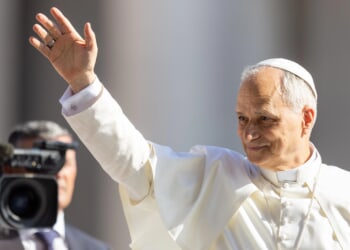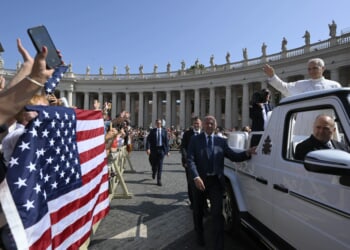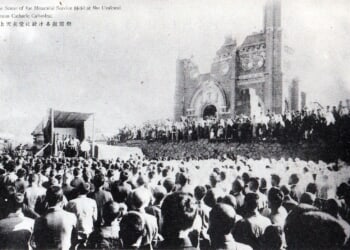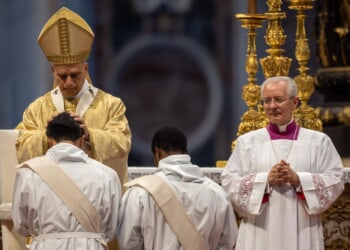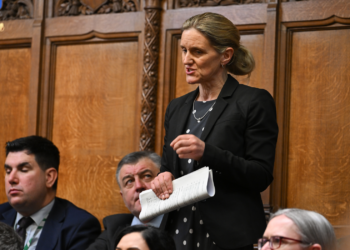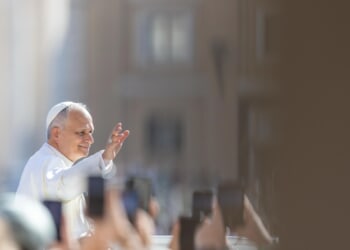Birmingham, Ala., Aug 22, 2025 /
07:00 am
Most people think of St. Maximilian Kolbe as the heroic martyr who traded places with another prisoner in Auschwitz, resulting in a painful death by starvation, but there is much more of the story to tell. What would give someone the courage to do such a thing, and why was this sacrifice not the reason he was canonized?
These are but a couple of the questions answered in “The Knight,” which airs at 2 p.m. ET on Saturday, Aug. 23, on EWTN.
This special program highlights three historical events that had a decisive impact on Kolbe’s life and his responses, which speak to us even today.
The first event was the 200th anniversary of Freemasonry. During the so-called celebration, “[t]he Vatican was besieged by thousands of people carrying banners depicting Satan knocking down Michelangelo and the inscription ‘Satan must reign in the Vatican, and the pope will be his servant.’”
What could a college student studying to become a Franciscan priest do? Kolbe asked his college rector’s permission to form an organization called the Knights of the Immaculata. Kolbe, who had been deeply impacted by the apparitions of Our Lady to St. Catherine Laboure, tasked his members with distributing Miraculous Medals, which Our Lady promised St. Catherine Laboure would transform the lives of those who wore them.
Kolbe said: “Distribute her medallion wherever you can to children, so that they always wear it around their necks, and to the elderly, and young people in particular, so that under her protection they have enough strength to fend off so many temptations and snares lurking in our times, and to those who do not go to the church, or who are afraid to go to confession, who scoff at religious practices, who laugh at the truths of the faith, who are bogged in moral mud, or who are outside the Church in heresy. To these, it is necessary to offer the medal … ask them to … wear it, and … earnestly implore the Immaculata for their conversion.”
The second event, which deeply impacted Kolbe, was the Soviet invasion of Poland. But for the Miracle on the Vistula, the Bolshevik army would have invaded Warsaw in August 1920. The battle helped now-Father Kolbe understand that “for Christian Europe, communism was a serious, if not more serious, threat than the Freemasons.”
Kolbe used the monasteries he built in Poland to deliver an inexpensive newspaper to a largely uneducated and poor audience for whom printed materials were a luxury. His newspaper did not attack communism. Knight of the Immaculata, as it was known, presented a different vision of life — the Gospel of Jesus Christ. The newspaper helped readers discover the beauty they already had in their lives, whether they knew it or not.
“Man’s heart is too big to be filled with money, sensuality, or the deceptive, though intoxicating, mist of fame,” he wrote. “It yearns for a higher good, boundless and everlasting, and such a good is only God.”
The first issue reached 70,000 people. A sister publication in Japan would be extremely significant after the Americans dropped an atomic bomb on Nagasaki.
Kolbe’s plans to broadcast the first Catholic radio program and to launch a television station were interrupted by the third and most well-known historic event in his life: World War II. During the war, 6 million Poles were murdered, and 3,500 were displaced. Kolbe brought aid and food to those in need and was allowed to publish one more issue of the Knight.
He wrote: “Happiness … founded not on truth, cannot be, like untruth itself, lasting. Only truth can be, and is, the unbreakable foundation of happiness for both individual people and humanity as a whole.”
Viewers of “The Knight” will learn that this is what probably got Kolbe arrested and sent to a variety of concentration camps along with 100,000 others. It was in Auschwitz that Kolbe traded his life for a man with a wife and children. The effect his action had on other prisoners and on those who learned of it was incalculable — and it continues to resonate with all who hear it.
As Pope John Paul II would say when canonizing his fellow Pole: “In this place of terrible suffering, Father Maximilian Kolbe won a spiritual victory, similar to that of Christ, voluntarily giving himself up to die in a starvation cell for his brother.”
Yet the pope did not canonize Kolbe for this courageous sacrifice but because he lived a life of heroic virtue. His voluntary death in the concentration camp was but the culmination of a life of sacrifice and walking with the Immaculata, who helped him know the will of God.




